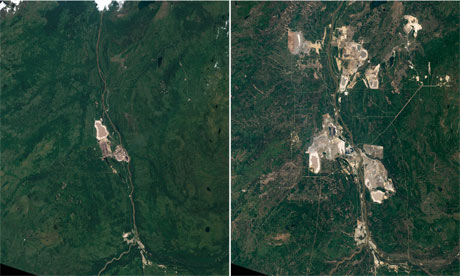
Satellite images of the Athabasca oil sands in Alberta, Canada, show the expansion between 1984 (left) and 2011. Environmentalists criticise the destruction of forests and pollution of air and water, while Nasa scientist James Hansen says if the oil sands were exploited as projected, the carbon emissions produced would mean it was "game over for the climate". Photograph: Landsat/NASA
Davies is savage about the UK government's position, for which fellow LibDem Norman Baker is the responsible minister: "The whole isssue of tar sands is becoming a huge source of embarrassment to every Liberal Democrat who wants and expects a government of which we are part to be leading on environment issues and in the fight against climate change."
The UK has given secret help to Canada, as the Canadians seeks to prevent the EU declaring fuel from tar sands as having a heavy carbon footprint, which it does compared to ordinary crude oil. Such a move, backed by many other EU countries, would make tar sands fuels less attractive to Europe's fuel suppliers and set an unwelcome precedent for Canada's vast oil sands project.
The Canadian government has repeatedly argued that the EU proposal, under the Fuel Quality Directive (FQD), is unworkable. According to a UK Foreign Office document released under Freedom of Information rules, a London-based Canadian diplomat called Sushma Gera met her UK counterparts on 21 October.
"Sushma told me that the US consideration of similar measures had just failed, as it was 'unimplementable'. She promised to send further details," reads the record of the meeting. The only similar measures in the US are being delivered by California's Air Resources Board, which has now written to Europe's Commissioner for Climate Action, Connie Hedegaard, to clear up what the ARB describes tactfully as a "misunderstanding".
The ARB letter, which I have seen, is a clear rebuttal of the Canadian arguments and states: "The principle of accounting for the lifecycle greenhouse gas emissions of transportation fuels, including those associated with the production and transportation of crude oil, continues to be an important feature of the [Californian] Low Carbon Fuel Standard." The measures are clearly alive and well, not failed.
At the same meeting, Gera had also pushed Canada's official line that "the reporting requirements in the [EU] proposal would impose a significant administrative and financial burden on companies". Oil giant BP, which has significant tar sands interests, told Baker the same in a letter, claiming: "The regulatory burden would be considerable at a time when the industry is already creaking under the weight of a heavy regulatory regime."
The ARB tells Hedegaard, who is responsible for the FQD, that this is this opposite of the case in California: "The expected administrative burden for companies to comply with ARB's high-carbon intensity crude oil provisions is minimal. Oil companies already track and report their crude oil information as a normal course of business, both for internal purposes as well as government reporting requirements."
The Canadian government told me: "We don't comment on specifics of bilateral diplomatic discussions." The UK Foreign Office failed to get back to me at all.
Meanwhile, Norman Baker has been defending his position again. It is very similar to his last defence, which I also found deeply unconvincing. Once again, Baker claims he is not delaying action while the government admits in private its proposal would lead to delay, would rather propose a new plan than deal with a known issue right now and blames green groups for not solving the problem for him.
Colin Baines, campaigns manager at the Co-operative, is similarly unimpressed: "The UK government's counter proposal will achieve one thing, the significant delay of specific measures to deal with tar sands emissions, despite robust independent science and advice being available now that supports immediate action."
Baines adds: "It is worth highlighting that the EU proposal already includes a review clause to address conventional crudes with above average carbon intensity and work has already commenced in this area. We are happy with the EU proposal as the quickest and best way forward to achieving this."
taken from http://www.guardian.co.uk/environment/damian-carrington-blog/2011/dec/06/oil-sands-tar-canada-uk-fuel

No comments:
Post a Comment